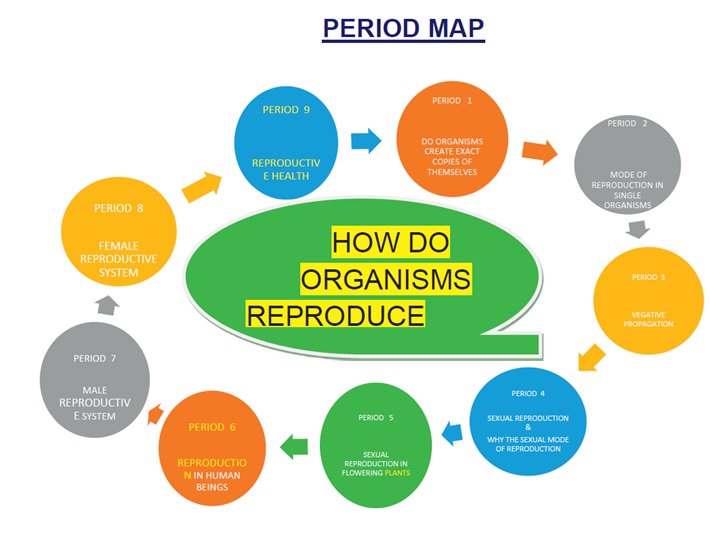- CLASS : X
- CHAPTER 7: HOW DO ORGANISMS REPRODUCE
- TOTAL NO. OF PERIODS: 09
Curricular Goals and Competencies
Curricular Goal – 1: Explore the reproduction – continuation of life, types of reproduction, characteristics of.Competency -1.1: Classification of reproduction, how lower and higher organisms, unicellular and multi -cellular produces new organisms, Structure of male and female reproductive parts in human beings and plant
Competency -1.2: Investigate the nature and properties of chemicals helps i.e. hormones, enzymes Investigate the nature and properties of chemicals help i.e. hormones, enzymes
Competency -1.3 Describes and represents symbol in reproduction process
Curricular Goal – 2: Explore the Reproduction around the world and understands scientific principals and laws based on observation and analysis
Competency -2.1: Applies the Mendal’s Laws, Darwin principles to explain the variation in individual organisms
Competency -2.2: Explain the relationship to form Variations due to changes or imbalance of hormones, enzymes, temperature and other factors
Competency -2.4: Manipulate and analyses different characteristics and advantages of the asexual and sexual reproduction, mitosis and meiosis
Competency -2.5: Define the scientific terms in reproduction, relationship between mitosis and meiosis, chromosome numbers in mathematical expression
Curricular Goal – 3 : Explore the structure and functions of the living world(reproduction) at the cellular level
Competency - 3.1 : Explain the role of cellular components in reproduction ( Nucleus, chromosomes, proteins, hormones, enzymes, genes)
Curricular Goal – 4 : Explore interconnectedness between organisms and their environment through reproduction
Competency - 4.4 : Analyses patterns of inheritance of traits in terms of mode of reproduction and its consequences at a population (Niche)level
Curricular Goal - 5: Draws linkages between scientific knowledge and knowledge across other curricular areas
Competency - 5.1 : Examine a case study related to the use of Reproductive sciences to produce different variety of plants
Curricular Goal - 7: Develops awareness of the most current discoveries, ideas and frontiers in all areas of reproductive knowledge
Competency – 7.1 : Tissue culture, IVF, Cloning, Artificial fertilization
Curricular Goal - 8: Explores the nature of science by doing science
Competency - 8.2 : Based on the data and understand of scientific concepts of reproduction , communicating scientific terminologies on reproduction
CBSE 10th Bio How Do Organisms Reproduce Periods
| Period No. | Topic | Learning outcomes |
| 1 | Do Organisms create exact copies of themselves? The importance of variation | Explains the role of cellular components in reproduction – Nucleus, chromosomes,
proteins, hormones, enzymes, genes Analyses the role of variations in survival of the species. |
| 2 | Modes of Reproduction used by single organisms | Differentiates asexual and sexual
reproduction Classifies asexual reproduction into different types |
| 3 | Vegetative propagation | Explains the methods of vegetative propagation in plants |
| 4 | Sexual reproduction, Why the sexual Mode of Reproduction | .Differentiates mitosis and meiosis Explains importance of meiosis in sexual reproduction. |
| 5 | Sexual Reproduction in Flowering plants | Classifies unisexual and bisexual flowers Investigates and identifies self-pollinated flowers and cross-pollinated flowers |
| 6 | Reproduction in Human Beings | Relates puberty with physiological changes at the onset of puberty in male and female |
| 7 | Male Reproductive System | Explains the structure and function of Male reproductive system |
| 8 | Female Reproductive System, What happens when the egg is not fertilized? | Explains the structure and function of female reproductive system |
| 9 | Reproductive Health | Analyses birth control methods and build an awareness towards reproduction and reproductive health. |


0 comments:
Give Your valuable suggestions and comments